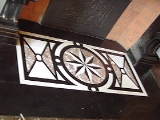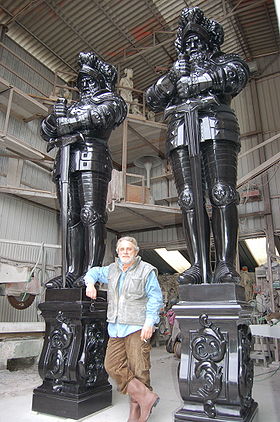
Noir Belge
Encyclopedia
Noir Belge is collective noun referring to black limestone
found on several sites in Belgium
. Some trade names refer more specifically to the quarry were the material was found, for example "Noir de Mazy" or "Noir de Golzinne". Some Noir belge marble deposit belongs to a fine-grained calcareous sedimentary formation dated Frasnian era (Upper Devonian
– around 360 millions years ago) and located on the northern border of Namur
sedimentary basin. A few black limestones located in the lower Carboniferous (near the city of Dinant
)
 To the naked eye the differences between the black marbles from different quarries are almost impossible to determine.
To the naked eye the differences between the black marbles from different quarries are almost impossible to determine.
Good "Belgian Black" is dug as an inconspicuous grey stone but becomes immaculately deep black and shining as it is polished. Its relative scarcity is due to the difficult exploiting conditions (quarries in underground operation, for example of Golzinne and Bioul). Today it's one of the most expensive marbles in the world.
). It was used in mosaic
s in local villas. The name "Paragone del Belgio" or "Diaspro del Belgio" of this marble originated from the use of Belgium black stones to test the content of gold in coinage.
Since Renaissance the "Noir Belge" marble was widely used as a decorative construction material. Due to its immaculate velvety black appearance and its remarkable high gloss, it was preferred by artisans across Europe. It became exceedingly widespread since it was preferred as the deep-black background for the colourful Intarsia
or Pietra dura
works from the Florentine Medici workshop founded in 1588. "Noir Belge" was even used by Italian artisans in the intarsia decoration of the Taj Mahal
in India
.
In northern Europe, especially in Belgium
and France
, "Noir Belge" was also applied to large decorative structures such as stairs, floorings, altars, fireplaces... It was often used in combination with white marble imported from Carrara
but also with local red and grey marbles. It was applied on a large scale in chessboard floorings, for example in the Palace of Versailles
and the Chateau of Vaux-le-Vicomte
. Until the 1930s it remained popular in Art Deco
decorations such as clocks and vases.
From First World War onward, the difficulties linked to the underground exploration of the quarries combined with the progressive exhaustion of the precious resource led to a progressive limitation of the use of this marble to the most exclusive and prestigious architectural and artistic creations.
 Some buildings where "Noir Belge" was used;
Some buildings where "Noir Belge" was used;
Limestone
Limestone is a sedimentary rock composed largely of the minerals calcite and aragonite, which are different crystal forms of calcium carbonate . Many limestones are composed from skeletal fragments of marine organisms such as coral or foraminifera....
found on several sites in Belgium
Belgium
Belgium , officially the Kingdom of Belgium, is a federal state in Western Europe. It is a founding member of the European Union and hosts the EU's headquarters, and those of several other major international organisations such as NATO.Belgium is also a member of, or affiliated to, many...
. Some trade names refer more specifically to the quarry were the material was found, for example "Noir de Mazy" or "Noir de Golzinne". Some Noir belge marble deposit belongs to a fine-grained calcareous sedimentary formation dated Frasnian era (Upper Devonian
Devonian
The Devonian is a geologic period and system of the Paleozoic Era spanning from the end of the Silurian Period, about 416.0 ± 2.8 Mya , to the beginning of the Carboniferous Period, about 359.2 ± 2.5 Mya...
– around 360 millions years ago) and located on the northern border of Namur
Namur (city)
Namur is a city and municipality in Wallonia, in southern Belgium. It is both the capital of the province of Namur and of Wallonia....
sedimentary basin. A few black limestones located in the lower Carboniferous (near the city of Dinant
Dinant
Dinant is a Walloon city and municipality located on the River Meuse in the Belgian province of Namur, Belgium. The Dinant municipality includes the old communes of Anseremme, Bouvignes-sur-Meuse, Dréhance, Falmagne, Falmignoul, Foy-Notre-Dame, Furfooz, Lisogne, Sorinnes, and Thynes.-Origins to...
)

Good "Belgian Black" is dug as an inconspicuous grey stone but becomes immaculately deep black and shining as it is polished. Its relative scarcity is due to the difficult exploiting conditions (quarries in underground operation, for example of Golzinne and Bioul). Today it's one of the most expensive marbles in the world.
History
"Noir Belge" has been exploited since Roman Antiquity when the Belgian provinces belonged to the Roman Imperium (Gallia BelgicaGallia Belgica
Gallia Belgica was a Roman province located in what is now the southern part of the Netherlands, Belgium, Luxembourg, northeastern France, and western Germany. The indigenous population of Gallia Belgica, the Belgae, consisted of a mixture of Celtic and Germanic tribes...
). It was used in mosaic
Mosaic
Mosaic is the art of creating images with an assemblage of small pieces of colored glass, stone, or other materials. It may be a technique of decorative art, an aspect of interior decoration, or of cultural and spiritual significance as in a cathedral...
s in local villas. The name "Paragone del Belgio" or "Diaspro del Belgio" of this marble originated from the use of Belgium black stones to test the content of gold in coinage.
Since Renaissance the "Noir Belge" marble was widely used as a decorative construction material. Due to its immaculate velvety black appearance and its remarkable high gloss, it was preferred by artisans across Europe. It became exceedingly widespread since it was preferred as the deep-black background for the colourful Intarsia
Intarsia
Intarsia is a form of wood inlaying that is similar to marquetry. The term is also used for a similar technique used with small, highly polished stones set in a marble matrix .- History :...
or Pietra dura
Pietra dura
Pietra dura or pietre dure , called parchin kari in South Asia, is a term for the technique of using cut and fitted, highly-polished colored stones to create images. It is considered a decorative art...
works from the Florentine Medici workshop founded in 1588. "Noir Belge" was even used by Italian artisans in the intarsia decoration of the Taj Mahal
Taj Mahal
The Taj Mahal is a white Marble mausoleum located in Agra, India. It was built by Mughal emperor Shah Jahan in memory of his third wife, Mumtaz Mahal...
in India
India
India , officially the Republic of India , is a country in South Asia. It is the seventh-largest country by geographical area, the second-most populous country with over 1.2 billion people, and the most populous democracy in the world...
.
In northern Europe, especially in Belgium
Belgium
Belgium , officially the Kingdom of Belgium, is a federal state in Western Europe. It is a founding member of the European Union and hosts the EU's headquarters, and those of several other major international organisations such as NATO.Belgium is also a member of, or affiliated to, many...
and France
France
The French Republic , The French Republic , The French Republic , (commonly known as France , is a unitary semi-presidential republic in Western Europe with several overseas territories and islands located on other continents and in the Indian, Pacific, and Atlantic oceans. Metropolitan France...
, "Noir Belge" was also applied to large decorative structures such as stairs, floorings, altars, fireplaces... It was often used in combination with white marble imported from Carrara
Carrara
Carrara is a city and comune in the province of Massa-Carrara , notable for the white or blue-grey marble quarried there. It is on the Carrione River, some west-northwest of Florence....
but also with local red and grey marbles. It was applied on a large scale in chessboard floorings, for example in the Palace of Versailles
Palace of Versailles
The Palace of Versailles , or simply Versailles, is a royal château in Versailles in the Île-de-France region of France. In French it is the Château de Versailles....
and the Chateau of Vaux-le-Vicomte
Vaux-le-Vicomte
The Château de Vaux-le-Vicomte is a baroque French château located in Maincy, near Melun, 55 km southeast of Paris in the Seine-et-Marne département of France...
. Until the 1930s it remained popular in Art Deco
Art Deco
Art deco , or deco, is an eclectic artistic and design style that began in Paris in the 1920s and flourished internationally throughout the 1930s, into the World War II era. The style influenced all areas of design, including architecture and interior design, industrial design, fashion and...
decorations such as clocks and vases.
From First World War onward, the difficulties linked to the underground exploration of the quarries combined with the progressive exhaustion of the precious resource led to a progressive limitation of the use of this marble to the most exclusive and prestigious architectural and artistic creations.

- Palace of VersaillesPalace of VersaillesThe Palace of Versailles , or simply Versailles, is a royal château in Versailles in the Île-de-France region of France. In French it is the Château de Versailles....
in FranceFranceThe French Republic , The French Republic , The French Republic , (commonly known as France , is a unitary semi-presidential republic in Western Europe with several overseas territories and islands located on other continents and in the Indian, Pacific, and Atlantic oceans. Metropolitan France... - Carbide & Carbon BuildingCarbide & Carbon BuildingThe Carbide & Carbon Building is a Chicago landmark located at 230 N. Michigan Avenue. The building, which was built in 1929, is an example of Art Deco architecture designed by Daniel and Hubert Burnham, sons of architect Daniel Burnham, and was designated a Chicago Landmark on May 9, 1996...
in ChicagoChicagoChicago is the largest city in the US state of Illinois. With nearly 2.7 million residents, it is the most populous city in the Midwestern United States and the third most populous in the US, after New York City and Los Angeles...
External links
Sources
- "Les marbres belges à Versailles", by Prof. Eric Groessens (in FrenchFrench languageFrench is a Romance language spoken as a first language in France, the Romandy region in Switzerland, Wallonia and Brussels in Belgium, Monaco, the regions of Quebec and Acadia in Canada, and by various communities elsewhere. Second-language speakers of French are distributed throughout many parts...
) - "Les matériaux de construction de Belgique et du Nord de la France", by Prof. Eric Groessens (in FrenchFrench languageFrench is a Romance language spoken as a first language in France, the Romandy region in Switzerland, Wallonia and Brussels in Belgium, Monaco, the regions of Quebec and Acadia in Canada, and by various communities elsewhere. Second-language speakers of French are distributed throughout many parts...
)

